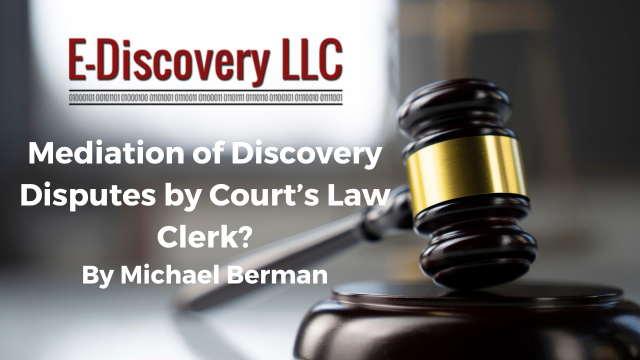
[EDRM Editor’s Note: The opinions and positions are those of Michael Berman.]
I have come across cases in which a Court’s law clerk conducted an informal conference with parties to resolve a discovery dispute.
For example, in Hipschman v. County of San Diego, 2024 WL 3206909 (S.D. Cal. June 26, 2024), counsel “participated in an informal discovery conference with the undersigned’s Judicial Law Clerk regarding the dispute.” [emphasis added]. The Chambers Rules of one U.S. California Magistrate Judge state that “the Court will determine whether to conduct an informal dispute resolution process with the parties or have the parties proceed directly to filing a formal discovery motion.”
In a recent case in New Mexico, “Defendants explicitly reject Plaintiff’s assertion that an agreement exists, and the Clerk’s Minutes for the informal discovery conference held on May 28, 2020 noted that no discovery issues were resolved.” Melo-Fernandez v. Bearden, 2020 WL 7353880, at *7 (D.N.M. Dec. 15, 2020)(emphasis added).
While I have not made any effort to exhaustively research this practice, it seems well-established in at least some part of the federal court of Idaho.
For example, a recent Idaho decision recited that “the Court’s clerk held an informal mediation” to resolve a discovery dispute. Rossow v. Jeppesen, 2024 WL 2959255, at *1 (D. Idaho June 11, 2024). In that District: “The Court’s discovery dispute process clearly states that the Court will not issue discovery orders unless an informal mediation with the law clerk proves unsuccessful….” Dickinson Frozen Foods, Inc. v. FPS Food Process Sols. Corp., 2020 WL 2841517, at *8 (D. Idaho June 1, 2020). The court’s website states that, for the Chief Judge: “The law clerk will then conduct an informal telephone conference with counsel where the law clerk may be able to offer suggestions that will resolve the dispute without the need for the Judge’s involvement.” [emphasis added]. In one case: “Following this conference, the parties continued to correspond on and off with the Court’s clerk regarding compliance with the discovery requests and the potential filing of a motion to compel.” TB Holding Company LLC, v. J&S Siding, 2024 WL 3067224, at *3 (D. Idaho June 20, 2024). Informal mediation by the law clerk appears to be a long-standing practice. Goody v. Jefferson Cnty., 2010 WL 3834025, at *4 (D. Idaho Sept. 23, 2010).
I have never seen or participated in such a procedure. Generally, mediation is a confidential and voluntary process, and I provide mediation services. Mediation of ESI Disputes – E-Discovery LLC (ediscoveryllc.com); see also JAMS: “Mediating E-Discovery Can Save Time and Money” (Dec. 23, 2023).
One federal judge told me that “I don’t give advice or guidelines. I issue orders.” I would have some concerns about participating in a mediation conducted by a judicial law clerk. For example, if the clerk makes “suggestions,” as noted in the Idaho process, are those the “suggestions” of a clerk, or the anticipated position of the Judge? Are the discussions confidential, or will the clerk report to the Judge that “I ‘suggested’ XYZ and the plaintiff was obstructionist and refused to cooperate”? Some courts have career law clerks; however, others hire newly-graduated lawyers, some of whom may not yet be admitted to the bar and likely none of whom are trained mediators. As such, they may lack the skills and experience to mediate discovery disputes.
For example, if the clerk makes “suggestions,” as noted in the Idaho process, are those the “suggestions” of a clerk, or the anticipated position of the Judge? Are the discussions confidential, or will the clerk report to the Judge that “I ‘suggested’ XYZ and the plaintiff was obstructionist and refused to cooperate”?
Michael Berman, eDiscovery LLC.
Courts have many options other than the use of law clerks as mediators. For example, they can: refer a matter to a U.S. Magistrate Judge; refer it to a Court Appointed Neutral or “Special Master”;[1] direct the parties to retain a private mediator; or, order a video-recorded “meet and confer.” In one recent case, I was court-appointed to assist the parties in negotiating an ESI Protocol.
The fact that mediation by law clerks is a long-standing practice in the District of Idaho may indicate that my concerns are hypothetical and the process is problem-free. On the other hand, the fact that it does not appear to be a wide-spread practice may lead to the opposite conclusion.
Notes
[1] No More “Masters”? (Feb. 16, 2024).


